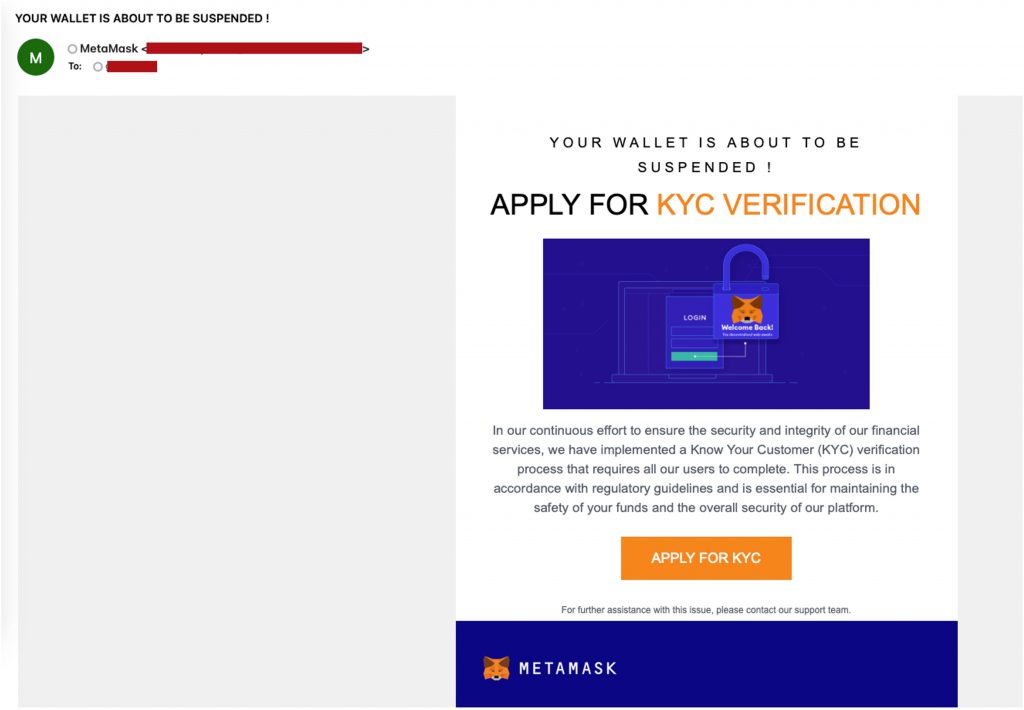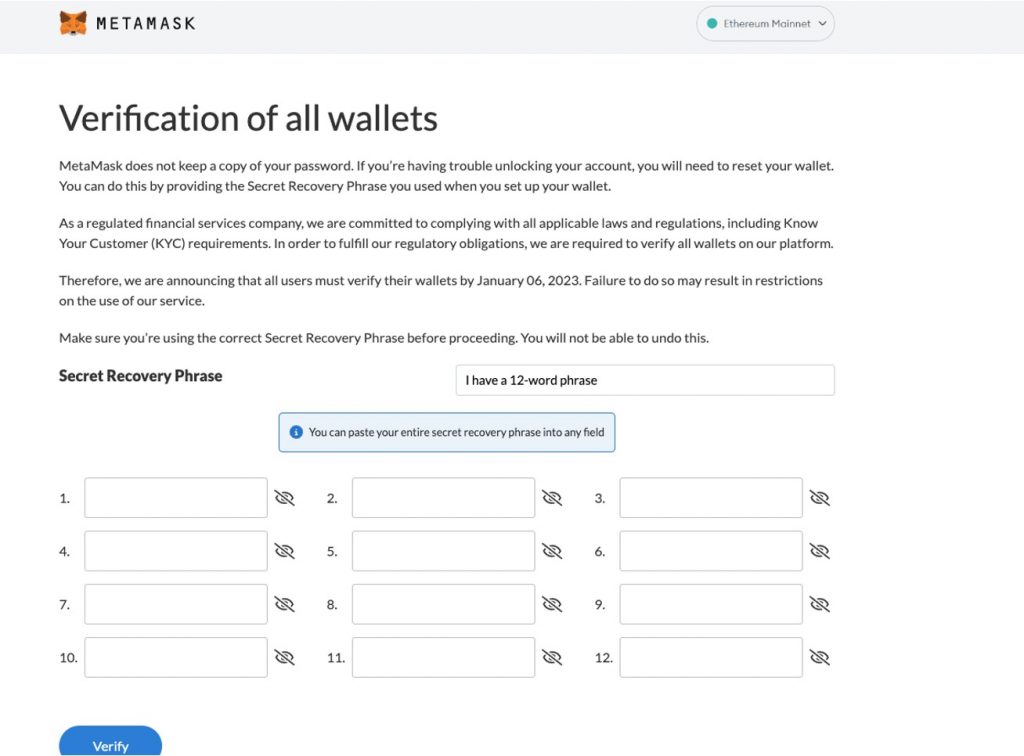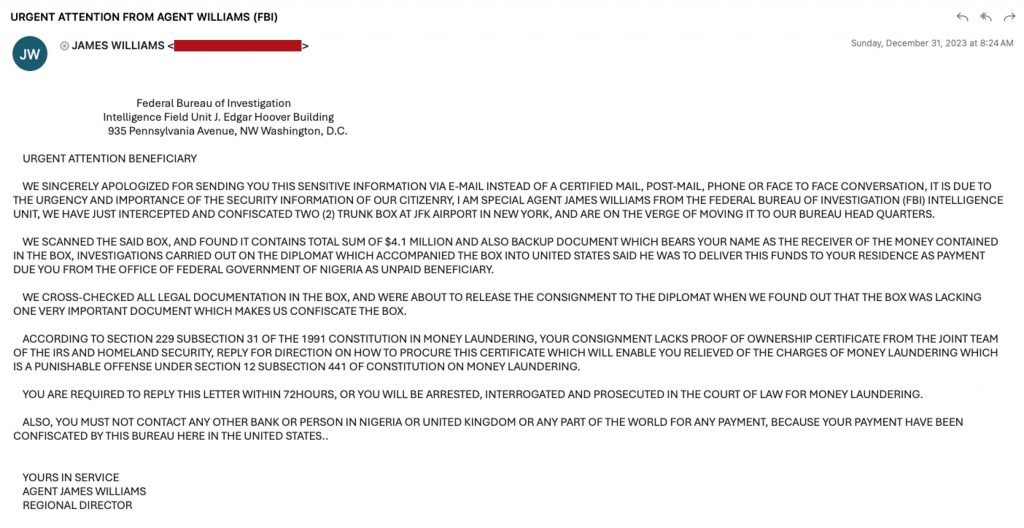This week we’ve found phishing attempts in which scammers are impersonating Apple iCloud, MetaMask, and the FBI. Would you have been able to spot these scams?
Phishing / Imposter Scams
Imposter scams have made up a huge number of the scams reported to the FTC over the past few years. Posing as trusted brands, scammers send text messages and emails containing phishing links and, using various tactics, prompt you to click on them.
The links take you to phishing pages that can record all your PII. For example, your Social Security number, login credentials, and credit card details. The scammers can thus use your PII to steal even more from you, including your money and even your identity.
They devise fake scenarios in which you need to take action in a hurry, such as verifying your account or updating your payment details. No matter which tactics are used, their goal is to take you to fake login pages where you’ll be lured to enter lots of your PII.
Fake iCloud Storage Alert
Would you panic if you received a text saying you’ll lose all the photos stored in your iCloud unless you upgrade immediately using the attached link? Calm down and take a close look. The text could be a SCAM! Last week we detected such fake iCloud notifications over 7,871 times:
- CLOUD SERVICE TERMINATION. Upgrade now or lose your stored photos and files. <URL>
- TERMINATION ALERT FOR CLOUD ACCOUNT. Upgrade without delay, or risk losing your stored photos and files. <URL>
On Apple’s community page, users are posting that they’ve received similar texts, likely wondering if they’re legitimate or not:

Don’t click on any links! The text messages are NOT genuine. You will be taken to a fake iCloud login page.
If you submit your Apple ID login information, scammers can record these credentials and thus take control of your account. Next, they can make purchases using your stored credit card details and even access your private data, such as your location data and stored usernames and passwords. Don’t let them!
Protect Yourself from Scams
The truth is, there are lots of scams and scam sites on the internet and they’re getting even more difficult to detect with common sense alone. However, for an easy and reliable method of detecting and avoiding scam sites, check out Trend Micro ID Protection.
ID Protection can shield you from scams, fake and malware-infected websites, dangerous emails, phishing links, and lots more! If you come across something dangerous online, you’ll be alerted in real time so you’ll know to stay well clear.
MetaMask Phishing Email
If you were to see an email saying your crypto wallet is going to be suspended, what would you do? We’ve reported on fake MetaMask emails several times before, and this week there’s a new version to watch out for:

Falsely claiming that you need to complete the latest Know Your Customer (KYC) process to keep your MetaMask wallet, scammers instruct you to click on the embedded button to apply. Don’t do so! That button will take you to a fake MetaMask login page:

The fake page asks you to enter your recovery phrase. With it, the scammers can gain full control of your crypto wallet and steal all your funds. Be careful!
Safety Tip: Always check the web address, and if possible, go to the official website directly instead of using an attached link. The REAL MetaMask web address is metamask.io.
Fake FBI Email
Sometimes scammers don’t even bother making a bogus website. They just ask you to reply to their emails. Pretending to be from the FBI, they attempt to convince you that you’re involved in a case that’s under investigation, threatening you into thinking that you could be arrested if you don’t reply to the email:

Please ignore such emails. If you do reply, they will contact you and try to trick you into providing more sensitive information or ask you to wire money to “settle” the case. Be careful!
Tips to Stay Safe Online
- Double-check the sender’s mobile number and email address. Even if it seems legitimate, think twice before you take any action.
- Reach out to the company’s customer service directly for help and support.
- Never click on dubious links or attachments! Stick to official websites and apps.
- If you’ve accidentally revealed your PII somewhere, change your passwords immediately and inform your bank and/or other companies that scammers may contact them pretending to be you.
- Check if any of your PII has been leaked and secure your social media accounts using Trend Micro ID Protection.
- Finally, add an extra layer of protection to your devices with Trend Micro Maximum Security. Its Web Threat Protection, Ransomware Protection, Anti-phishing, and Anti-spam Protection will help you combat scams and cyberattacks.
If you’ve found this article an interesting and/or helpful read, please do SHARE it with friends and family to help keep the online community secure and protected. Also, please consider leaving a comment or LIKE below. Happy New Year!
